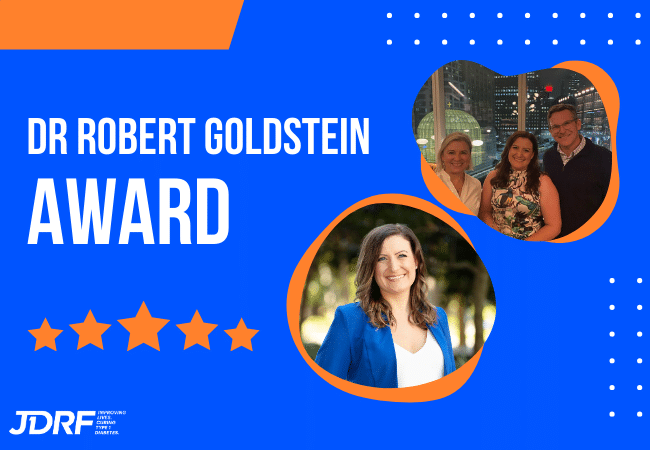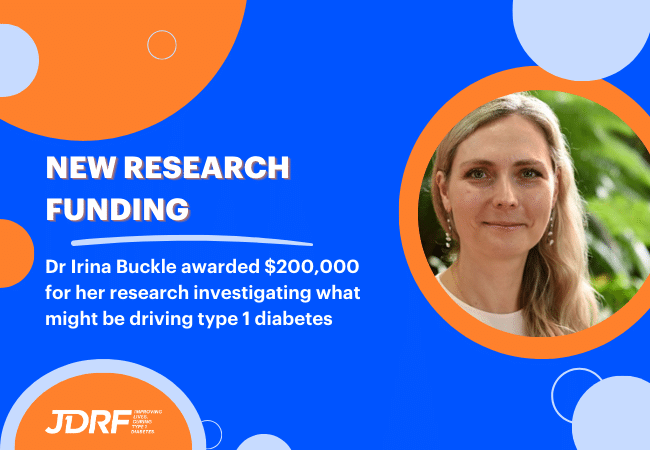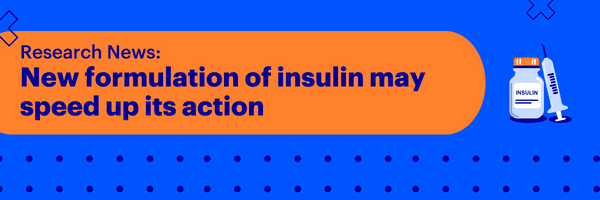New clinical trial looking for newly diagnosed children and young adults with T1D

In people newly diagnosed with type 1 diabetes (T1D) there is often a ‘honeymoon’ phase where some pancreatic beta cells are still able to produce insulin.
Committed to improving the lives of those with T1D, JDRF has invested in several clinical studies under the Australasian Type 1 Diabetes Immunotherapy Collaborative (ATIC), investigating whether we can extend this period and delay the progression of T1D. This would minimise the amount of insulin needed to maintain blood glucose levels in the safe range and improve blood glucose management.
One of these trials is called IAA (Abatacept combined with nasal insulin in recently-diagnosed type 1 diabetes), which aims to test whether combining two therapies can slow the immune system’s attack on the beta cells in the pancreas.
The IAA trial is currently seeking children and young adults recently diagnosed with T1D who are aged between 6 and 21 years.

“This is a promising trial which looks at whether we can delay the progression of type 1 diabetes in newly diagnosed patients. If successful, it could mean that people can stay in the honeymoon period for longer, with less need for insulin. The IAA trial is one of the few trials in the world that will combine more than one immunotherapy. We are tremendously excited to start this trial in Australia”
~Associate Professor John Wentworth, lead investigator, Australasian Type 1 Diabetes Immunotherapy Collaborative (ATIC)
What is the trial testing?
The trial is testing whether two immunotherapies called abatacept and nasal insulin in combination, can delay the progression of T1D in people who have been diagnosed in the last 100 days.
Specifically, it will look at whether using these therapies in combination can slow the immune system from attacking the remaining insulin-producing beta cells.
What are the drugs being tested?
Abatacept is an injectable drug currently used and approved by the Therapeutic Goods Administration (TGA) for autoimmune diseases like rheumatoid arthritis. It works by blocking the function of T cells which are involved with inflammation, immune activation, and attack on pancreatic beta cells in T1D.
Nasal insulin is delivered as a spray and doesn’t affect blood sugar levels. Previous trials of nasal insulin have shown that it is safe to use. Nasal insulin works by training the immune system to stop attacking insulin-producing cells inside the pancreas. Note participants will be required to manage basal and bolus insulin as normal.
Who is eligible?
The trial is looking for around 60 children and young adults aged 6 to 21 years who have been diagnosed with T1D in the last 100 days.
To ensure that this trial is suitable, an eligibility assessment will be completed by the study team prior to the first visit to a trial centre.
Participants must be based in or be able to travel to the trial centres in Melbourne, Sydney, Brisbane, Adelaide and Perth.
Participants need to be vaccinated against covid-19 before starting treatment in this trial.
What will be involved?
The trial is a randomised controlled trial meaning that participants will be randomly placed into a group to receive abatacept and either the nasal insulin or a ‘placebo’ nasal spray. A placebo is a safe substance without any therapeutic effect.
Abatacept will be injected under the skin once a week and the nasal insulin or placebo spray will be inhaled for 10 days initially and then twice a week thereafter. This will be done for 48 weeks, with another 48 week follow up period.
The study will mainly look at how much insulin is still being produced after the treatment, as an indicator of how many pancreatic beta cells are still functional. It will also look at other measures such as the proportion of time in safe blood glucose targets (time in range), the number of hypoglycaemic events, autoantibody levels and adverse events.
Participants will visit their local trial centre around 16 times over two years. Five of these are extended visits lasting 3-4 hours. However, most visits will take less than one hour.
How do I find out more?
Watch a video with more information on the trial here. To receive further information or enrol in the trial please visit the ATIC website.
Read more
- See more JDRF-funded clinical trials
- Explore all research projects that JDRF Australia funds




